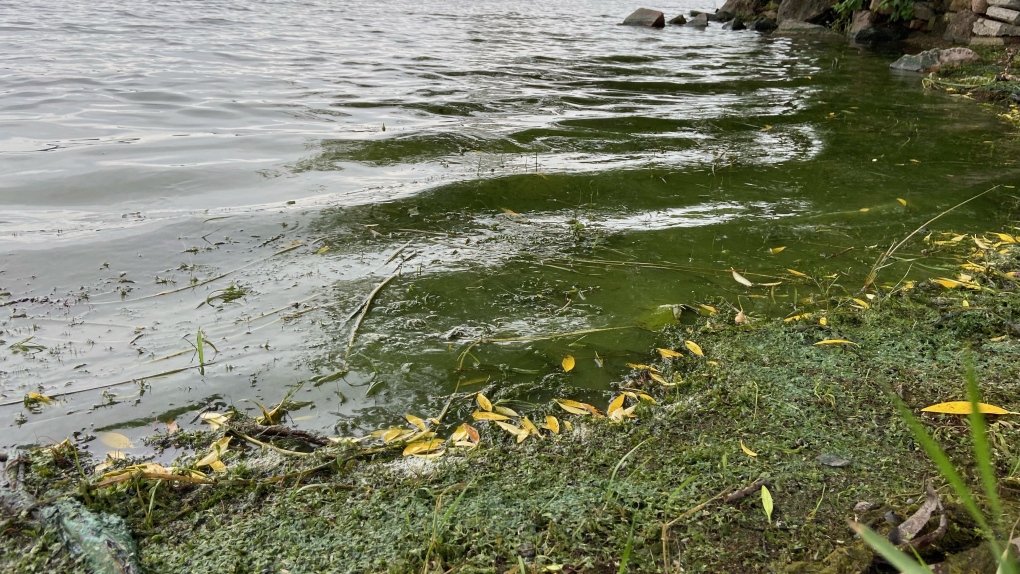
Suspected blue-green algae bloom found in Muskrat Lake
 The Renfrew County and District Health Unit is warning residents near Muskrat Lake of a suspected blue-green algae bloom, which may be toxic. (Dylan Dyson/CTV News Ottawa)
The Renfrew County and District Health Unit is warning residents near Muskrat Lake of a suspected blue-green algae bloom, which may be toxic. (Dylan Dyson/CTV News Ottawa)
The Renfrew County and District Health Unit is advising residents of Cobden and the surrounding area of a possible harmful algae bloom found in Muskrat Lake.
In a news release, the RCDHU said a plant-like substance was spotted on the surface of the lake recently which resembles a blue-green algae bloom. Testing is underway to determine whether the bloom is harmful.
“[The Ontario Clean Water Agency] is also regularly sampling at the Cobden water treatment plant to ensure the drinking water is safe to consume,” the RCDHU said.
The Township of Whitewater Region says Cobden Beach will be closed to swimming and recreational purposes until test results are received. It notes, however, that the municipal water supply is not affected.
"Please note that although blue-green algae may have been detected in the lake, no blue-green algae have been found in the municipal drinking water and is still safe to drink. There is no public health risk for residents of Cobden who are on the municipal drinking water system," a release from the township says.
Blue-green algae blooms are potentially toxic. They release toxins into the water when they’re damaged or when they start to decay. Direct contact can cause skin irritation and affected water can cause vomiting, nausea, diarrhea and abdominal pain if ingested in higher concentrations.
RCDHU advises people using Muskrat Lake to be on the lookout for algae blooms. If a bloom is visible, please take the following precautions:
- Avoid direct contact with the bloom.
- Avoid using the water in the vicinity of a bloom for drinking, bathing or showering and do not allow children, pets or livestock to drink or swim in the water.
- Boiling the water for drinking purposes should be avoided because boiling may release more toxins into the water.
- Toxins that may be released by blue-green algae are not removed by small scale residential treatment systems such as filtration, chlorination or ultraviolet light disinfection. Surface water is never a safe source of drinking water without effective treatment.
- Residents should not rely on water jug filtration systems as they do not protect against the toxins.
- Avoid cooking with the water because foods may absorb the toxin during the cooking process.
- Caution should be exercised with respect to eating fish caught in water where blue-green algae blooms have occurred. Avoid eating the liver, kidneys and other organs of fish caught in the water.
- On lakes and rivers where blue-green algae blooms are confirmed and visible, people who use the surface water for their private drinking water supply should consider an alternate, protected source of water.
The RCDHU says it will continue to monitor the water conditions on Muskrat Lake.
"As of July 4, there were no known algae blooms detected by health unit staff," the health unit said.
CTVNews.ca Top Stories

'They needed people inside Air Canada:' Police announce arrests in Pearson gold heist
Police say one former and one current employee of Air Canada are among the nine suspects that are facing charges in connection with the gold heist at Pearson International Airport last year.
House admonishes ArriveCan contractor in rare parliamentary show of power
MPs enacted an extraordinary, rarely used parliamentary power on Wednesday, summonsing an ArriveCan contractor to appear before the House of Commons where he was admonished publicly and forced to provide answers to the questions MPs said he'd previously evaded.
Leafs star Auston Matthews finishes season with 69 goals
Auston Matthews won't be joining the NHL's 70-goal club this season.
Trump lawyers say Stormy Daniels refused subpoena outside a Brooklyn bar, papers left 'at her feet'
Donald Trump's legal team says it tried serving Stormy Daniels a subpoena as she arrived for an event at a bar in Brooklyn last month, but the porn actor, who is expected to be a witness at the former president's criminal trial, refused to take it and walked away.
Why drivers in Eastern Canada could see big gas price spikes, and other Canadians won't
Drivers in Eastern Canada face a big increase in gas prices because of various factors, especially the higher cost of the summer blend, industry analysts say.
Doug Ford calls on Ontario Speaker to reverse Queen's Park keffiyeh ban
Ontario Premier Doug Ford is calling on Speaker Ted Arnott to reverse a ban on keffiyehs at Queen's Park, describing the move as “needlessly” divisive.
'A living nightmare': Winnipeg woman sentenced following campaign of harassment against man after online date
A Winnipeg woman was sentenced to house arrest after a single date with a man she met online culminated in her harassing him for years, and spurred false allegations which resulted in the innocent man being arrested three times.
Woman who pressured boyfriend to kill his ex in 2000s granted absences from prison
A woman who pressured her boyfriend into killing his teenage ex more than a decade ago will be allowed to leave prison for weeks at a time.
Customers disappointed after email listing $60K Tim Hortons prize sent in error
Several Tim Horton’s customers are feeling great disappointment after being told by the company that an email stating they won a boat worth nearly $60,000 was sent in error.
































